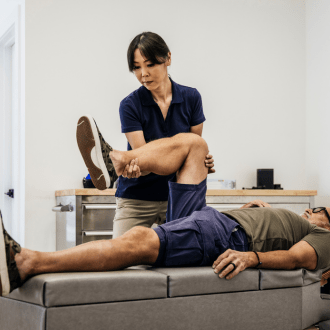At Torrens University Australia, we’re committed to continuously improving our curriculum to ensure our students are equipped with the latest industry developments. That's why we’ve refreshed our Bachelor of Health Science (Clinical Myotherapy) at Think Education.
This change has been made to modernise the course and better meet the current demands of the industry. Our new curriculum is more efficient and focused, ensuring that you gain the necessary skills and knowledge required in the ever-evolving healthcare and manual therapy field.
By condensing the curriculum, the course now offers a more targeted educational experience, aligning with current industry demands and best practices in Myotherapy.
“The bachelor’s degree really nailed just what I was looking for, with a course outline that was going to give me the skills that I needed to treat the patients like I wanted to. I also love their city location, and the facilities have constantly impressed me along the way,” said Matt Parkes, Bachelor of Health Science (Clinical Myotherapy) student.
What are the updates to the Bachelor of Health Science (Clinical Myotherapy)?
The most notable update to the Bachelor of Health Science (Clinical Myotherapy) is the reduction of subjects from 36 to 24. This change is designed to enhance the learning outcomes by focusing on the most essential aspects of Clinical Myotherapy.
This streamlined approach reduces the overall study load and helps balance life, work and studies. This makes our Bachelor of Clinical Myotherapy more accessible for working professionals today. Three pain management subjects have been combined into one with updated evidence-based information. We have re-focused our two dry needling subjects from needle manipulation into one dry needling subject and overhauled our anatomy and exercise subjects (a total of seven, now four).
You will gain a more concentrated understanding of Clinical Myotherapy, with a curriculum that is directly aligned with the required skills and knowledge. The updated course is designed to equip you with a robust understanding of Myotherapy techniques with subjects such as Manual Therapy Interventions, which includes advanced neuromuscular techniques and electrotherapeutics, patient assessment with our Clinical Assessment and Pain Management subjects, as well as treatment planning with Pre-Clinical Skills and Exercise Prescription subjects. With our Clinical Practicum subjects, you'll benefit from hands-on experience by treating real-life patients in our student-led clinic, ensuring you're well-prepared to enter the workforce as a skilled and confident Clinical Myotherapist.
“Placement was crucial for me to get to where I am now. Seeing different practitioners in different environments with different client bases gave me encouragement and confidence in the subject material I was learning, it showed me how relevant my education was and showed me what the next steps would look like once I got my degree and ventured out into the workforce. Such an excellent part of my journey, I hope everyone gets as much out of it as I have,” Matt Parkes, student.
What qualifications does the Myotherapy degree provide?
In Australia, Myotherapy is officially recognised as a physical therapy with an Advanced Diploma (Myotherapy). However, to practice as a Clinical Myotherapist, you will need to hold a Bachelor of Health Science (Clinical Myotherapy).
When you graduate with the Bachelor of Health Science (Clinical Myotherapy) you will have a solid foundation of knowledge and skills in a variety of health-care settings, making sure you're ready to tackle professional challenges.
For those working as personal trainers and massage therapists, this degree provides a pathway to expand their expertise and offer more comprehensive services to their clients. By gaining a deeper understanding of neuromusculoskeletal health, pain, and movement, graduates can enhance their practice by offering specialised Myotherapy treatments alongside their existing services.
The Bachelor of Health Science (Clinical Myotherapy) is recognised by key professional associations in Australia, meaning that you will be eligible for membership and professional registration.
Who is suitable for the Clinical Myotherapy degree?
The Bachelor of Health Science (Clinical Myotherapy) is ideal for people who are passionate about health practice and are looking to specialise in musculoskeletal health. If you have an interest in helping others and are intrigued by the science of pain management, hands-on therapies, and clinical exercise prescription, a degree in Clinical Myotherapy can launch your career in healthcare, offering you the skills to pursue a rewarding and dynamic profession.
For professionals with associated qualifications such as personal trainers and remedial massage therapists, this degree is ideal for upskilling and expanding their scope of practice. Clinical Myotherapy complements both massage and exercise science by taking an extra step in addressing and preventing musculoskeletal pain, providing even more comprehensive care. With our Upgrade Program and Block Credit agreement in place, this means those with associated qualifications may gain exemptions due to previous studies.
This course is absolutely suitable for anyone with a background in health science, wellness or any related field who is looking to upskill, broaden their skillset or specialise.
Our Bachelor of Clinical Myotherapy is an industry-led qualification that meets the needs of the modern healthcare industry. With a focus on practical skills and real-world applications, we ensure that you graduate prepared to enter the workforce as a competent and confident Clinical Myotherapist.
When you study with Think Education, you benefit from experienced educators, state-of-the-art facilities, strong connections with industry and professional associations, as well as a modernised and industry-endorsed curriculum.



